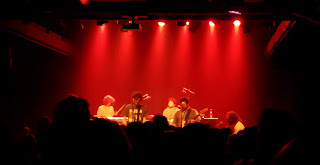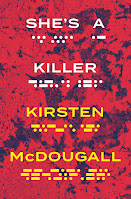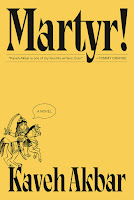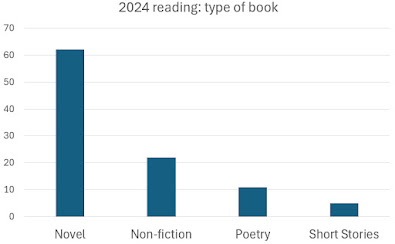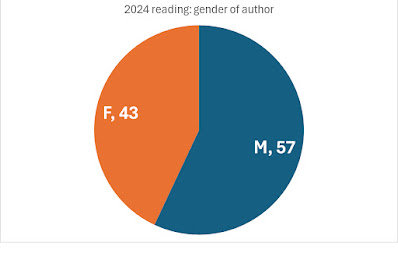MUSIC - OCTOBER
Sunday, December 7, 2025
October-November Consumption Diary
Thursday, October 2, 2025
August-September Consumption Diary
MUSIC - AUGUST
BIOGRAPHICAL INTERLUDE
 |
| Box One |
I'm one of the judges for the fiction section for the 2026 Ockham New Zealand Book Awards, which means I need to read every novel and short story collection published in 2025 that is submitted for the awards. So far I've received two boxes of books (33 books in total) and there's at least one more box to come later in the year. I'd read three books already (score). So that's going to mean I smash some of the reading targets I set at the start of the year (read 100+ books, read 20+ physical books) but means some of the other targets will be harder to achieve (like read 10 non-fiction books by female authors).
(I could tally the numbers now and see, but I'm going to keep myself in the dark till I do my 2025 reading wrap up post).
Before the first box of books to judge arrived, I got a box of books I'd bought from the THWUP sale, which was mostly just Geoff Cochranes. I started a project to re-read all his poetry collections and come up with my own Best Of list, and compare it to the contents of The Collected Geoff Cochrane (which I bought but haven't read). I didn't quite finish this process before the Ockham judging bow wave hit, so this might be a Jan 2026 project :)
BOOKS
Into India, Aztec Noon*, Acetylene*, 84-484*, Pocket Edition*, Hypnic Jerks*, The Worm in the Tequila*, The Bengal Engine's Mango Afterglow* by Geoff Cochrane (poetry, physical books, NZ) - see above.
Tin Nimbus by Geoff Cochrane (novel, physical book, NZ) - Hadn't read this before. If you've only read Geoff's poetry, this novel is pretty much what you'd imagine his novel would be like. Alcoholism. Attention to life at the level of the sentence, the word, the syllable. And the sex scene - the chutzpah!
The Bookshop Detectives: Tea and Cake and Death by Gareth and Louise Ward (novel, audiobook, NZ) - Book Two in the series. Diminishing marginal returns.
The CIA Book Club by Charlie English (non-fiction, audiobook, UK)
Things Become Other Things: A Walking Memoir by Craig Mod (non-fiction, audiobook, US)
Vanishing World by Sayaka Murata (novel, audiobook, Japan) - was actually written before Convenience Store Woman (terrific) and Earthlings (even better), but translated into English after those two and published in 2025. Not as strong.
Show Don't Tell by Curtis Sittenfeld (short stories, audiobook, US) - Kinda hated that a story made me empathise with Jeff Bezos. But: goooood stories.
Audition by Katie Kitamura (novel, audiobook, US) - Flesh by David Szalay is still my favourite book on the Booker Shortlist
A City on Mars by Kelly and Zach Weinersmith (non-fiction, audiobook, US) - both a superserious takedown of space colony hype and also quite funny.
Rusty Brown by Chris Ware (graphic novel, physical book, US) - a real doorstop of a book. Can be thrilling at the level of the page in terms of composition / juxtaposition, but can also feel slow and dense. Would be interested in what someone who reads a lot of graphic novels thinks.
Under the Eye of the Big Bird by Hiromi Kawakami (novel, audiobook, Japan) - think Earthlings x Never Let Me Go.
Electric Spark: the Enigma of Muriel Spark by Frances Wilson (non-fiction, audiobook, UK) - overpromised and underdelivered in terms of revelations (though there was certainly a lot of words).
+ 8 NZ works of fiction in my judging capacity, which I will remain cagey about.
FILM & TV
Honestly, the only thing I can remember watching (besides sport), was The Truman Show with my kids (first time for them, not for me). Maybe the odd Taskmaster episode. I tried watching Season 2 of The Night Agent, got bored. Season 2 of Squid Game: ditto. Season 1 of Untamed: samesies.
Books! Give me books! Or podcasts. Or another season of Unreal (please?).
Oh, I watched the Devo documentary, and Beau is Afraid, finished Black Mirror Season 7, and the documentary series Wrestlers about OVW (that was really good).
MUSIC - SEPTEMBER
Saturday, August 9, 2025
June-July 2025 consumption diary
MUSIC - JUNE
BIOGRAPHICAL/GEOGRAPHICAL INTERLUDE
My in-laws inherited some money and took us to Japan in July. It was hot. It was humid. The ages in our party ranged from 10 to 70-mumble. I was the only one with any non-Duolingo, non-Google Translate Japanese education (School C baby!). We did a fairly standard Greatest Hits route (Tokyo, Kyoto/Osaka/Nara, Hiroshima).
And... it was great.
BOOKS
(lotta travel / sharing rooms with snuffly kids = lotta audiobooks)
The Proof of My Innocence by Jonathan Coe (novel, audiobook, UK) - good
Playworld by Adam Ross (novel, audiobook, US) - Felt like a novel written by someone immersed in the college creative writing industrial machine who takes a long time between books. Oh wait...
Pounamu Pounamu by Witi Ihimaera (short stories, audiobook, NZ)
How to Hold a Cockroach by Matthew Maxwell (fiction?, audiobook, US) - just don't.
Careless People: a story of where I used to work by Sarah Wynn-Williams (non-fiction, audiobook, NZ)
Courting the Wild Twin by Martin Shaw (non-fiction, audiobook, UK)
Universality by Natasha Brown (novel, audiobook, UK) - on the Booker Longlist... didn't hit for me like Brown's debut, Assembly.
Flesh by David Szalay (novel, audiobook, UK/Hungary) - on the Booker Longlist... this one hit for me. V v v v v good.
The Forgotten Forest by Robert Vennell (non-fiction, audiobook, NZ)
The Wretched of the Earth by Franz Fanon (non-fiction, audiobook, France)
Pure Innocent Fun by Ira Madison III (non-fiction, audiobook, US) - contender for the most annoying book of the year.
A Beautiful Family by Jennifer Trevelyan (novel, audiobook, NZ) - not what I was expecting. Much more subdued than I presumed from the hype.
Slow Down: The Degrowth Manifesto by Kohei Saito (non-fiction, audiobook, Japan)
Well Met by Jen DeLuca (novel, audiobook, US) - trope-city.
The Shetland Way by Marianne Brown (non-fiction, audiobook, UK)
Perspectives by Laurent Binet (novel, audiobook, France) - a few aspects are hard to believe, but there should be more intellectual romps.
A Lack of Good Sons by Jake Arthur (poetry, physical book, NZ)
The Bookshop Detectives: Dead Girl Gone by Gareth Ward and Louise Ward (novel, audiobook, NZ)
Landfall 249 (literary journal, physical book, NZ)
Demolition of the Century by Duncan Sarkies (novel, physical book, NZ)
Star Gazers by Duncan Sarkies (novel, physical book, NZ) - check out my review for Landfall here.
MOVIES & TV
Shoresy Season 1 - Why can't I get the later seasons in NZ? Why!?
The Eternaut Season 1
Dept Q Season 1
The Bear Season 4
Welcome to Wrexham Season 4
Paddington in Peru
Gladiator 2
Sharko
Tenet*
(I'm forgetting what else I watched on the plane...)
Happy Gilmore 2
Unreal (WWE) Season 1
Aunty Donna's Coffee Cafe Season 1
MUSIC - JULY
Monday, June 2, 2025
April-May Consumption Diary
MUSIC - APRIL
BOOKS
Hine Toa: A Story of Bravery by Ngāhuia the Awekōtuku (non-fiction, audiobook, NZ)
Rejection: fiction by Tony Tulathimutte (short stories, audiobook, US)
The Axeman's Carnival by Catherine Chidgey (novel, audiobook, NZ)
The Serviceberry: an economy of gifts and abundance by Robin Wall Kimmerer (non-fiction, audiobook, US)
Pretty Ugly by Kirsty Gunn (short stories, physical book, NZ)
Middle Youth by Morgan Bach (poetry, physical book, NZ)
Biter by Claudia Jardin (poetry, physical book, NZ)
he's so MASC by Chris Tse (poetry, physical book, NZ)
The making of another major motion picture masterpiece by Tom Hanks (novel, audiobook, US)
On the calculation of volume, part one, by Solvej Balle (novel, audiobook, Denmark)
Recognising the stranger: on Palestine and narrative by Isabella Hammad (non-fiction, audiobook, UK/Palestone)
Kāwai: for such a time as this by Monty Soutar (novel, audiobook, NZ)
Ash by Louise Wallace (novel, physical book, NZ)
FILM & TV
Andor - Season 2 - This is my Star Wars. Lots of Better Caul Saul vs Breaking Bad comparisons to be had if I had the time to write a thinkpiece...
Rogue One*
The Rehearsal - Season 2
The Last of Us - Season 2
Twisters
Mountainhead
Trap
A Mistake
Inside Man 2
Wicked
Young Sheldon - my daughter binged all the seasons so I caught a fair amount.
MUSIC - MAY
Thursday, April 3, 2025
March consumption diary
MUSIC
Juice by Tim Winton (audiobook, novel, Australia, 2024). A good book in the end, marred by the fact the narrator said "cachet" instead of "cache" 90% of the time (post-apocalptic, so lots of caching)... Couldn't even be consistently wrong. (There were other mispronounciations, too. Tagging this for next time someone asks what my pet peeve is).
The extraordinary disappointments of Leopold Berry, Sunderworld v-01, by Ransom Riggs (audiobook, novel, US, 2024) - Not really my thing.
Tuesday, March 4, 2025
January-Februrary 2025 Consumption Diary
MUSIC - JAN
READING
18 books so far this year. On pace for 108 (yeah, but, holiday reading... but also, no poetry collections yet...)
The Islanders by Christopher Priest (novel, physical book, UK, 2011)The Rules of Backyard Cricket by Jock Serong (novel, physical book, Aus, 2016)
Funny Story by Emily Henry (novel, audiobook, US, 2024)
Doxology by Nell Zink (novel, physical book, audiobook, US, 2019)
Are you there, God? It's me, Margaret (novel, audiobook, US, 1970)
The Survivors by Steve Braunias (non-fiction, audiobook, NZ, 2024)
TransAtlantic by Colum McCann (novel, Ireland, 2013)
Orbital by Samantha Harvey (novel, UK, 2024)
Foraging New Zealand by Peter Langlands (non-fiction, physical book, NZ, 2024)
Fourth Wing by Rebecca Yarros (novel, audiobook, US, 2023)
Magic Pill by Johann Hari (non-fiction, audiobook, UK, 2024)
When it All Went to Custard by Danielle Hawkins (novel, audiobook, NZ, 2019)
Northern Lights (His Dark Materials book 1) by Philip Pullman (novel, audiobook, UK, 1995)
The Colour of Magic (Discworld Book 1) by Terry Pratchett (novel, audiobook, UK, 1983)
Twist by Colum McCann (novel, physical book, Ireland, 2025)
Villa Incognito by Tom Robbins (novel, audiobook, US, 2003)
MOVIES & TV
Rogue Heroes (of the SAS) - Seasons 1 & 2
The Jackal - Season 1
Black Doves - Season 1
Ludwig - Season 1
The Kins of Tupelo - Season 1
Win or Lose - eps 1-4 (me and my son are really enjoying this)
The Lost Children
Night Bitch
Speed*
Mrs Doubtfire* (umm...)
MUSIC - FEB
Tuesday, December 31, 2024
2024 This Fluid Thrill Awards: Best Reading
One hundred.
I had five reading targets for the year, all of which I met, but there was no target for gross number of books.
How'd I do it? When you look at what format I consumed these books, the answer might seem to be through my ears...

Best Reading of 2024
Outline by Rachel Cusk (2014)
She's a Killer by Kirsten McDougall (2021)
Holy Moses this was great. This seems weird to say, and only just occurred to me several weeks after reading it, but it's like a grown-up Fight Club. The disaffection. The bifurcation. The sardonic wit. But without the empty nihilism and cheap shocks.
Wellness by Nathan Hill (2023)
Wonderful. Part of me feels I shouldn't have loved it so much as it's lineage back through Jonathan Franzen is pretty clear (even without Oprah's seal of approval for Wellness), but it deals with things I'm interested in (and made me interested in things I wasn't previously) and feels big without being overblown or tryhard. Need to go back and read The Nix now.
Romantic Comedy by Curtis Sittenfeld (2023)
Here's what I said about it in April:
I'm a sucker for stories that immerse me in a world I was sort of interested in already but not obsessively so, like Saturday Night Live (which Sittenfeld repatches as The Night Owls in her novel). Pair this with a not-too-typical, not-too-out-there love story and you've got a winner.
The good test of a book like this, which is trying to have its genre cake and eat it too, is whether you can remember much of the plot or characters at the end of the year. This one absolutely passes this test. Memorable and smart. *Chefs kiss*
Martyr by Kaveh Akbar (2024)
This could be the start of a bad joke: Acclaimed poet writes a literary novel about death, religion, sexuality, loss, nationhood and lies... Except it fucking rules.The narrative hinges on a pretty incredible (as in: hard to believe, though not hard to predict) twist, and yet somehow it doesn't scuttle the whole enterprise.The most fun you can have while being miserable. Highly recommended.
Right Story, Wrong Story by Tyson Yunkaporta (2023)
First non-fiction on this list. First Australian. First first nations. Second book by Yunkaporta to make one of my year-end lists.Here's what I said about it in February:
A worthy successor to Sand Talk, but I'm worried I might come across as one of the wrong kind of fans of Yunkaporta's books (who Yunkaporta addresses in this latest book).Subsequently, I took part in an cross-discipline, online competition-cum-capacity-building-thingamee about indigenous perspectives on energy and climate change. Yunkaporta was one of the guest speakers and he was the same caustic, insightful, unserious-and-dead-serious-simultaneously self as presented in his (audio)books.
Skippy Dies by Paul Murray (2011)
Another book I was on the fence about reading (having already committed many hours to listening to the very good, but very Irish Franzen-y The Bee Sting already this year).Another book I ended up really enjoying. I think I preferred this to The Bee Sting because it's a bit less Franzen-y and because I myself have been grappling with a plot point not dissimilar to (not a spoiler, guys) Skippy dying!!!
Another fat book cluster. Unlike with Nathan Hill, I preferred Murray's earlier book to his newer one. It felt wilder. Less Seriously Funny Family Saga and more Stranger Things without the STRANGE THINGS (though there's plenty of lower case strangeness).
Big Swiss by Jen Beagin (2023)
Here's what I said about it in May:
Yeah! This was excellent. Funny, dark-at-times, possibly even profound. And it has dogs in it!I really liked that the protagonist/narrator was late 40s (I think) but language and ideas still seemed to be alive to them. It felt true(ish) to my inner dialogue as a early 40s person.Totally unrelated negative-impulse: I don't want to Google how old Elizabeth Bennett's parents are in Pride and Prejudice...
Nothing further to add, your honour. The Defence rests.
Companion Piece by Ali Smith (2022)
Here's what I said about it in October:The great Ali Smith keeps on being great in uncomfortable ways.It's incredible how much now-ness Smith gets into her books. You can pretty much lock in a slot in next year's list for Glif (and maybe it's companion piece, Glyph, if it comes out and I read it before the end of the year)... though I find the sight of the word 'Glif' very triggering as someone who often gets called Cliff in email, and occasionally Graig.
Poūkahangahatus by Tayi Tibble (2018)
Graphs and shit
Reading targets for 2025
- Read 100 books (why not?)
- Read at least 10 single-author poetry collections
- Read at least 20 physical books
- Read at least 10 non-fiction books by female authors
- Non-white + translated > 40
Thursday, December 26, 2024
2024 This Fluid Thrill Music Awards
The awards:
- top ten albums released in 2024 (with honourable mentions)
- top song released in 2024 (with honourable mention)
- best artists discovered in 2024 that have been around a long time
Here's a playlist to listen along to selections from the prizewinners in 2024...
Top ten* albums of 2024
White Roses, My God by Alan Sparhawk
I'm not usually a fan of ultra-processed vocals. Nor of solo albums where the artist is trying so hard to make an aural break from previous bands (in this case: the majestic Low, the raucous Retribution Gospel Choir and funky Derecho Rhythm Section).
But Alan Sparhawk, my God.
And while I'm a massive fan of Low (seeing them live at Bodega in 2016 is probably a top five gig), I wasn't so high on the glitchy, electronic sound of Double Negative (2018) and HEY WHAT (2021), so to take that glitchy, electronic angle and turn it up to 11...
But Alan Sparhawk, my God.
Of course, after the death of your life partner and band mate (Mimi Parker) you want to obliterate old selves. But to forge something so listenable from such angular parts? The best grief-stricken record since Hummingbird?
Whether you come to this record from a rock, slow-core, hip hop or electronica background, chances are it'll speak to you.
My God, Alan. Bless you.
Lived Here for a While by Good Looks
Album opener 'If it's gone' might have been my song of the year, if top ten albums didn't render themselves ineligible. Tracks like 'Self-destructor', 'White Out', and 'Can You See Me Tonight?' aren't far behind. But repeated listens allows slower tunes to rise up. 'Broken Body' is about disability, childhood and regret. 'Why Don't You Believe Me?' about a mother-son relationship where it's the son's turn to let the side down.
These guys are from Austin, Texas, but sound (to me, at least) Australian. In researching their origins I learnt about the disastrous lead-in to this album.
The day after they released their 2022 debut, the clairvoyantly titled Bummer Year, guitarist Jake Ames was nearly killed in a hit-and-run. After a long recovery, the band got back and they road, only for their van to catch fire and destroy all their gear, instruments, laptops, and merch.Big Swimmer by King Hannah
He first me five years laterSaid that Craig and I worked too well together(New York, Let's Do Nothing)
Craig and I have beenCraig and I have beenWatching quite disturbingDocumentaries in the evenings(Suddenly, Your Hand)
My Light, My Destroyer by Cassandra Jenkins
Lighthouse by Francis of Delirium
Tigers Blood by Waxahatchee
Manning Fireworks by MJ Lenderman
In Lieu of Flowers by Aaron West and the Roaring Twenties
I missed you motherfuckers badOver again and over again and over againI missed you motherfuckers bad
Rebuild Report by Hockey Dad
Lustre by The Buoys
- Pedro The Lion - Santa Cruz
- Hamish Hawk - A Firmer Hand
- ILDES - Tangk
- Friko - Where we've been, where we go from here
- Everything Everything - Mountainhead
- Quivers - Oyster Cuts
- Margaret Glaspy - Echo The Diamond
- Arborist - An Endless Sequence of Dead Zeroes
- Gord Downie - Lustre Parfait (not sure I can ever live the shame down of missing this when it came out) - and while I'm at it, I also missed and liked Paul Langlois Band's Guess What.
'Lagunita' by Lizzie No
"And I’ve learned to love the sinner and the sin / See the brush in the painting, taste the calf in the gelatin."











